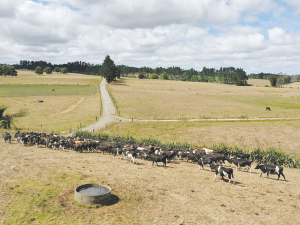Forest & Bird launches 2025–2026 Summer Adventure Challenges for all ages
Forest & Bird's Kiwi Conservation Club is inviting New Zealanders of all ages to embrace the outdoors with its Summer Adventure Challenges.
 All farmers have to be careful in the sun but farmers in more northern parts of the country experience higher UV radiation for longer.
All farmers have to be careful in the sun but farmers in more northern parts of the country experience higher UV radiation for longer.
With summer around the corner, farmers are being urged to take steps to lower their risk of skin cancer.
People who work outside receive up to 10 times more UV radiation exposure than indoor workers, putting them at higher risk of developing skin cancer, according to the Cancer Society.
It says not everyone realises the hidden hazard of over-exposure to ultra-violet (UV) radiation.
Additionally, items that can protect you from UV radiation, like sun protective clothing, sunscreen, hats, and sunglasses are tax deductable for farmers who are self employed.
Cancer Society medical director Dr Kate Gregory says skin cancer is the most common cancer in Aotearoa New Zealand.
"Fortunately, we now know that there are things we can do to lower our risk. It is important that we embed SunSmart practices in our lives from a very young age as UV damage accumulates over time.
"Also, if you are working outside, it is essential that you take steps to protect yourself from UV radiation. It i never too late to start.
"These actions can make a real difference in reducing the risk of skin cancers."
Otago Farmer Jeremy Wales, from Baldwin Farm, in the Knobbie Range has been farming for 24 years. Generally a man of few words he still wants to spread the message of taking care while working outdoors. "The sun is hard and hot in Central, and you don't want to get done over by skin cancer! Cover up, wear a hat, and put your sunnies on."
Gregory notes that most skin cancers can be treated successfully if caught early.
"It is so important for everyone, particularly those spending large amounts of time outdoors, to regularly check their skin.
"And remember that you cannot see or feel UV radiation - it can be harmful even on a cool or cloudy day. Because UV damage accumulates over time, we recommend that farmers use sun protection all day.
"Be particularly careful from the beginning of September to April between the hours of 10am-4pm when UV levels are highest."
All farmers have to be careful in the sun but farmers in more northern parts of the country experience higher UV radiation for longer.
Tips When Out on the Farm
Wear items that can protect you while outdoors. Depending on the requirements, this could include:
Additional reductions to costs for forest owners in the Emissions Trading Scheme Registry (ETS) have been announced by the Government.
Animal welfare is of paramount importance to New Zealand's dairy industry, with consumers increasingly interested in how food is produced, not just the quality of the final product.
Agriculture and Forestry Minister Todd McClay is encouraging farmers and growers to stay up to date with weather warnings and seek support should they need it.
The closure of SH2 Waioweka Gorge could result in significant delays and additional costs for freight customers around the Upper North Island, says Transporting New Zealand.
OPINION: The year has started positively for New Zealand dairy farmers and things are likely to get better.
Ministry for Primary Industries (MPI) Director General Ray Smith believes there is potential for an increase in dairy farming in New Zealand.
OPINION: There will be no cows at Europe's largest agricultural show in Paris this year for the first time ever…
OPINION: Canterbury grows most of the country's wheat, barley and oat crops. But persistently low wheat prices, coupled with a…